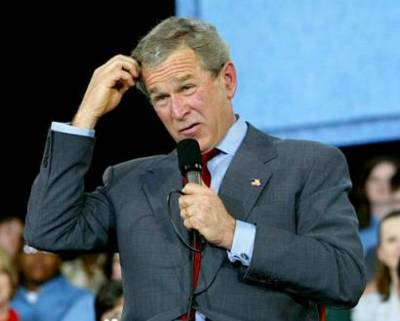
Sorry for the self important headline, but I have to say it comes as something of a shock. President Bush commented today that he saw the results of the Pakistani elections as "a victory in the war on terror" and, though I mightn't have phrased it in just those terms, I am pleased to announce I agree.
The interesting thing to note, as reports come in, is that the victory of opposition parties in parliamentary elections is seen as a vindication for moderates and democracy advocates who had been challenging Musharraf and his autocratic approach —and that —at the same time— these same forces within Pakistani politics are seen as a countervailing force to fundamentalism and violence. This had been the central message Benazir Bhutto was trying to convey as she campaigned for her Pakistan People's Party right up to the day of her assassination, that actual democracy and terror were natural adversaries in her country's politics.
As the election results begin to describe what might be a new ruling coalition, Ms. Bhutto may yet be proven right.
Pervez Musharraf has made a career for himself, exploiting Western fears of 'Islamo-fascists' coming to power in a nuclear state. We've held our noses while watching him dismantle an independent judiciary, watching him rewrite his country's constitution, jail dissidents, and close down media outlets critical of his regime. We knew this wasn't "democracy per se" —but political violence had us nervous and our professed friend promised some semblance (or perhaps dissemblance) of stability.
We funneled him billions in support for his own supposed counterterrorism efforts then stood by helplessly troubled by his accommodations with frontier tribal leaders that effectively established safe zones for the Taliban and al Qaeda on the Afghan border. We had to tolerate his pronouncements about "sovereignty" and threats of "consequences" should U.S. or NATO forces try to pursue an attack on terrorist bases.
Today, as the election results come in, not only Musharraf's political allies seem to have suffered rebuke. Islamist parties that had held power in the frontier provinces and provided political cover for the Taliban resurgence (and Musharraf's strange dealings) have also been voted out.
"The greatest achievement of this transition to democracy is the rout of religious extremists who wanted to plunge Pakistan into anarchy," Najam Sethi, editor of the Pakistan's Daily Times wrote on Wednesday. Asif Ali Zardari, Bhutto's widower and now the de facto leader of the PPP commented earlier that opposing terrorism is a war "against Pakistan and we have to fight it as our war."
We don't yet know whether Musharraf will cooperate in the democratic transformation of Pakistan. To do so, he would be forced to concede power to a leader he once deposed by means of a military coup. Thus far he has only called for a "harmonious coalition" to lead his country forward. Time will tell what that means. But if the people of Pakistan and the President of the United States (and me too!) can agree that actual democracy is an asset and not an obstacle to opposing terrorism, well then there's reason to hope.










1 comment:
Genial brief and this fill someone in on helped me alot in my college assignement. Thank you seeking your information.
Post a Comment